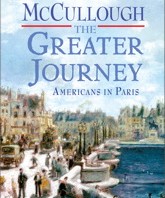David McCullough has come out with a delightful new book on the Americans who visited Paris in the nineteenth century and brought back what they learned to make contributions to American art, architecture, letters, science, medicine and even politics.
 I was actually surprised when I learned the subject of McCullough’s new book. He is a quintessentially American historian, and I had no idea that he had a francophile side. More than that, he explains that he thinks Americans do not appreciate the role France had in the constitution of American culture. It sounded to me like a very promising premise.
I was actually surprised when I learned the subject of McCullough’s new book. He is a quintessentially American historian, and I had no idea that he had a francophile side. More than that, he explains that he thinks Americans do not appreciate the role France had in the constitution of American culture. It sounded to me like a very promising premise.
What struck me the most was how strong the cultural differences were for the Americans arriving to Paris in the early 1830s, how thoroughly foreign the land and culture was to them. Although the United States had only existed for fifty years or so, it had clearly had time to establish values, perspectives and prejudices thoroughly different – and frequently opposed to those of the French. A simply fact, like that American women would refuse to be examined by a male doctor while French women had no problem with it, tells a great deal about how different the societies were.
The reading pleasure comes, of course, from the many individual stories and the windows they offer on the times and places of the book. The descriptions of daily life, of what people eat and wear and how they behave, as well as the American visitors’ diverse reactions to these novelties, are both entertaining and enlightening. The broader message – that of the cultural interchange between France and the United States and the role it had in constituting our fledgling nation – is fascinating. McCullough has put his finger on an unexpected and neglected aspect of American history, and of course told it wonderfully.
